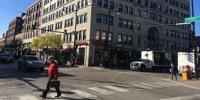
U.S. Rep. Mike Bost
The U.S. Supreme Court will step into a fight over whether Illinois' mail-in balloting regime is legal, as the high court has agreed to allow a Republican Illinois congressman to attempt to revive his lawsuit asserting Democratic lawmakers violated the Constitution and federal law by allowing mail-in ballots to be counted up to two weeks after Election Day.
On June 2, the Supreme Court granted a so-called writ of certiorari to U.S. Rep. Michael Bost in his dispute with Illinois' Democrat-dominated state government, which gives Bost the chance to argue before the court on the question of whether lower courts wrongly determined he lacked the ability to sue to challenge the state's controversial election law.
“It is an injustice that the courts would deny a federal candidate the ability to challenge an election provision that could lead to illegal votes being cast and counted for two weeks after Election Day,” said Tom Fitton, president of Judicial Watch, a Washington, D.C.-based conservative political organization providing attorneys to represent Bost in the action.
“The Supreme Court’s decision to hear this case is a critical opportunity to uphold federal law, protect voter rights, and ensure election integrity. Illinois’ 14-day extension of Election Day thwarts federal law, violates the civil rights of voters, and invites fraud.”
Bost, of downstate Jackson County, had turned to the U.S. Supreme Court for relief in November 2024, about five months after a divided appeals court had sided with the state in shutting down Bost's lawsuit.
Bost and two other Illinois Republicans had filed suit in 2022, just before that year's November general election. The lawsuit at the time sought a court order blocking Illinois from counting mail-in ballots received after Election Day, if those ballots included votes for federal offices, including U.S. House of Representatives, Senate or President.
The lawsuit took aim at a law enacted by Illinois' Democratic legislative supermajority in Springfield and Gov. JB Pritzker in 2020. That law had used the Covid pandemic to justify rewriting the state's election laws to greatly expand mail-in voting in Illinois.
The lawsuit claimed the Democrat-initiated and enacted laws violated federal election law and the constitutional rights of Illinois voters and candidates for federal office.
The lawsuit particularly takes aim at the rules requiring election authorities to count all mail-in ballots received up to 14 days after Election Day. The rules further require election officials to accept and count those ballots even if there is no proof they were actually mailed by Election Day, as the law claims to otherwise require.
Bost's lawsuit specifically claims Illinois' vote-by-mail regime clashes with a federal law that establishes an official Election Day for federal offices.
Under that federal law, votes must be cast by "the first Tuesday after the first Monday in November of every even-numbered year."
However, the lawsuit says, the Illinois vote-by-mail rules improperly turn "Election Day" into an election period, without authorization from Congress.
Critics of the law have asserted the change in the law creates new opportunities for dominant parties and powerful campaign organizations to manipulate the system and cheat by counting questionable or illegitimate ballots.
The plaintiffs have asserted Illinois' balloting system could allow potentially hundreds of thousands of otherwise invalid votes to sway close election contests.
Bost and some Republican voters who joined with him in the lawsuit have argued the law improperly "dilutes" the value of their votes and those case by others on or before Election Day, in keeping with federal law.
Illinois state election officials, with the support of the Illinois Democratic Party and the past support of the U.S. Justice Department, under the administration of Democratic former President Joe Biden, moved to dismiss the lawsuit. They argued Illinois law doesn't conflict with federal law because the Illinois law still requires all ballots to be mailed on or before Election Day, even if the law allows votes to be counted without any independent proof they actually were mailed at all.
Illinois Democrats have noted in court filings that striking down the law would make it more difficult for Democrats to win elections, as Democrats disproportionately vote by mail, compared to Republicans and other voters.
In court, a federal judge who was appointed by President Donald Trump during his first term in the White House, ruled against Bost, saying the congressman and his co-plaintiffs lacked "standing" to sue because they couldn't prove they were individually harmed by the extended vote acceptance period.
On appeal, a three-judge panel of the U.S. Seventh Circuit Court of Appeals split 2-1 in favor of the state.
In that ruling, Seventh Circuit judges John Z. Lee and Michael B. Brennan said neither the voters' vote dilution claims nor Bost's claims that the law improperly forced him and his campaign to spend significantly more time and money to monitor vote counting were enough to prove they were harmed.
Fitton, of Judicial Watch, has called that reasoning "absurd," saying "it is a scandal that the courts would deny a federal candidate the ability to challenge an election provision that could lead to illegal votes being cast and counted."
"Until recently, it was axiomatic that candidates had standing to challenge these regulations," Bost's Judicial Watch attorneys wrote in their petition to the Supreme Court.
"Indeed, 'it’s hard to imagine anyone who has a more particularized injury than the candidate has.' … That is because a candidate who 'pours money and sweat into a campaign, who spends time away from her job and family to traverse the campaign trail, and who puts her name on a ballot has an undeniably different - and more particularized - interest in the lawfulness of the election' than 'some random voter,'" they wrote.
In response, Illinois Attorney General Kwame Raoul argued the Supreme Court should reject Bost's petition because, in part, Bost's district - a gerrymandered district drawn by Illinois Democrats to pack in Republican voters and allow Democrats to compete in other downstate U.S. House districts - is too Republican to allow any allegedly suspicious mail-in ballots to place him in jeopardy of losing.
Raoul's office asserted stepping into this dispute would lead to a scenario in which Bost and other candidates could be wrongly awarded an "automatic" right to challenge state election law and rules.
They further asserted the Seventh Circuit's ruling was entirely consistent with other federal court precedents concerning candidate standing to sue states over election rules.
Bost and his attorneys, however, noted another federal appeals court, the U.S. Fifth Circuit Court of Appeals, reached the opposite conclusion, agreeing that the federal Election Day law prohibited the state of Mississippi from counting ballots received after Election Day.
Bost and his team said that set up a split among the federal appeals courts, which the Supreme Court must resolve.
Bost is also represented in the action by attorney Christine Svenson, of Palatine, Illinois.




